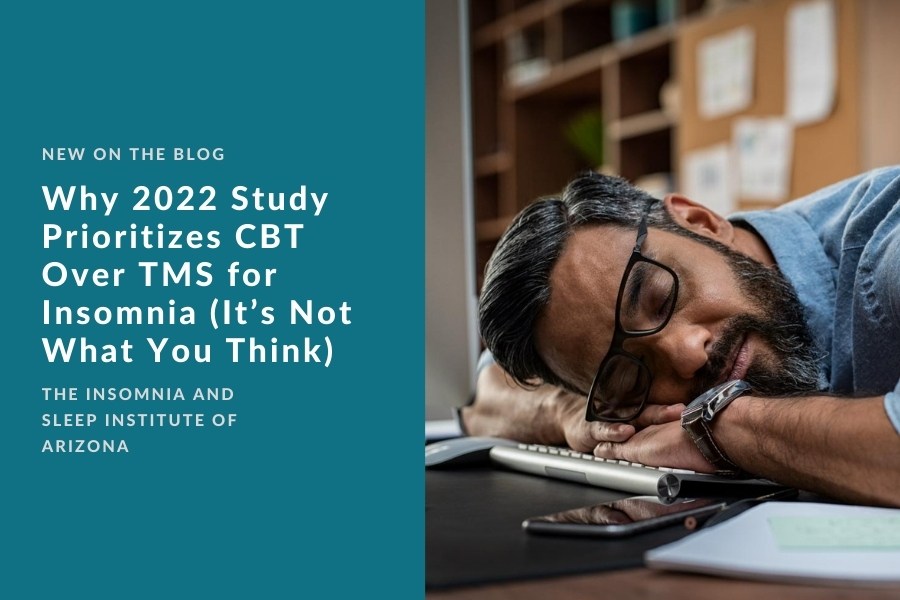What is the “best” insomnia treatment? For those who want to avoid pharmaceuticals, especially long-term use of them, for many years, the answer has been cognitive behavioral therapy (CBT-I). CBT-I has long been the preferred method at The Insomnia and Sleep Institute of Arizona, where we have a clinical psychologist focused on CBT-I in-office, but now there is transcranial magnetic stimulation (TMS). So, which one is best for you and your insomnia struggles? A recent 2022 study published in Sleep Science explores the treatment options available for one of the most common sleep disorders.
According to the authors of “Cognitive behavioral therapy for insomnia helps to reverse cognitive impairment in insomnia patients,” there are a variety of insomnia symptoms that may present, including “somatic and cognitive impairments.” Some sleep doctors prescribe medications, which can be dangerous for those suffering from chronic, long-term, perhaps lifelong insomnia (whereas OTC medications for acute insomnia, such as jet lag, are typically considered safe). The authors note that medications used for chronic insomnia have been shown to actually worsen cognitive impairment, particularly the popular benzodiazepine receptor agonists. Contrarily, CBT-I has “shown to be a reliable tool to improve the whole picture of insomnia.” This is in keeping with the approach and practices at our clinic—but what does this study say about TMS?
What is TMS?
TMS is a completely non-invasive treatment that uses a changing magnetic field to kick-start electric currents in specific parts of the brain to treat a myriad of issues. It was initially used to treat mood disorders, including depression and anxiety, but has recently shown to be quite effective at helping with other problems, too. Specifically, there is a keen interest in how it treats insomnia and restless leg syndrome. Many studies have supported its effectiveness since TMS can target the part of the brain that causes sleep disruption. Sleep doctors and patients alike appreciate that CBT-I and TMS are both non-invasive and safe options.
The article’s authors agree that CBT-I and TMS “result in an effective amelioration of the insomnia clinical picture.” However, they point out that “TMS is not yet an easily available procedure.” That is true at most clinics, but not at ours. We have long been committed to providing patients with the best, safest, and most effective treatments for all sleep disorders, which is why TMS was quickly added to our suite of treatments. It is true that it can be difficult to find TMS treatment for insomnia, which is why it is so important to only work with the best sleep doctors and institutions. The researchers lament, “Instead, CBT-I is widely used and has proved to be an efficient treatment for insomnia, with long-term benefits on sleep.”
Which is Right for You?
If you have struggled with insomnia and have undergone CBT-I therapy but still want to improve results, TMS might be for you. Alternatively, if you have not yet sought help for your insomnia, working with a sleep expert will determine which treatment to try first. In many cases, combining CBT-I with TMS can yield the best results. They take two very different approaches and complement one another quite well.
There are different and often many causes of insomnia. Understanding the root of your insomnia will help to inform treatment. Remember, neither CBT-I nor TMS are a “one and done” treatment. However, neither require long appointments and can fit easily into any schedule. Insomnia also affects children, and the patient’s age is also a factor in creating a treatment plan for insomnia.
Scheduling Your Sleep Consultation
A consultation with a sleep expert who can diagnose sleep disorders, and in turn, decide on testing and treatment, is the first step in getting the help you need. We are proud to be the Face of Sleep Medicine in Arizona with unprecedented staffing levels to best serve you. No referral is needed to visit the leading sleep clinic in Arizona. To start your journey to the best sleep of your life, contact The Insomnia and Sleep Institute today by calling the office or completing the online form right now.





